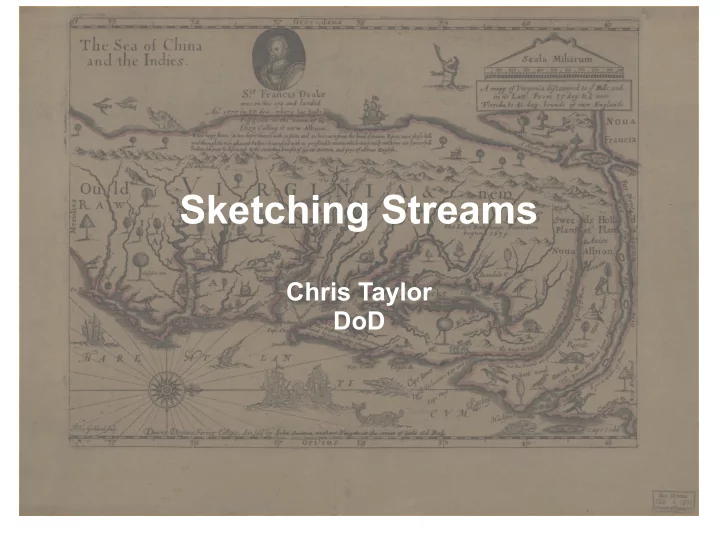

Sketching Streams Chris Taylor DoD
Overview ● What-Why Sketch? ● Sketches Hyper Log Log Sketch Frequency “Heavy Hitter” Sketch Quantile Sketch Theta Sketch
What-Why Sketch?
What-Why Sketch? ● Data sets exceed traditional commodity compute capabilities – Static and Streaming data – Data set is “noisy” (biology, physics) ● Approximate results have value
What-Why Sketch? ● Compute dynamic “summaries” of a dataset according to a predefined set of computational constraints – Storage size – Accuracy, precision...user provided tolerances ● Sketches are “monoidal” in nature; satisfying a suite of set operations (union, difference, etc) – Functional programming concepts – Parallel prefix summarization
What-Why Sketch? ● “Data analytic” platforms adopting sketches – Yahoo's “Data Sketching” library – Druid integration with Yahoo's library ** – Redis support – Several opensource projects for Spark/Hadoop ** Traditional Database, “Columnar” Stores, “Big Table” Database
What-Why Sketch? ● Measuring Performance – Using Chapel 1.15! – Measured sketch update performance – Each algorithm receives a randomly filled array of 100K integers – Each algorithm provided 5 minutes to 'add' or 'update' a sketch (serial loop) over sets of the 100K integers ● Results are the total number of 100K block-integer updates completed in ~5 minutes
HyperLogLog
HyperLogLog ● Philippe Flajolet ● Analyzes a stream of hashed values (bit-pattern observables) – Split each hashed value into m sets – Collects “runs” of zeros for each m set ● Provides a Stochastic Average using collected bit- pattern information – Compute a harmonic mean of each m bit set (for each new value)
HyperLogLog ● Hashed Value: 000011000111 ● Split hash into bit-pattern sets ( m =3): [ [000], [011], [000], [111] ] ● Compute running harmonic average over existing bit-pattern sets
HyperLogLog 12000 10000 8000 Run 1 Run 2 6000 Run 3 Run 4 Run 5 4000 2000 0 chpl python
HyperLogLog 300000 250000 200000 Run 1 Run 2 150000 Run 3 Run 4 Run 5 100000 50000 0 chpl-fast chpl python
Frequency Sketch
Frequency Sketch ● Implementation of Misra-Greis Algorithm ● Stores k-1 (item-counter) pairs as a set ● If a new item is in the set's range – Increment a counter – Else find an empty counter, add item, and set counter to one ● Decrement all k-counters if all counters have been allocated ● Over time, low frequency elements are removed, making space for higher frequency items.
Frequency Sketch 12000 10000 8000 Run 1 Run 2 6000 Run 3 Run 4 Run 5 4000 2000 0 chpl python
Frequency Sketch 300000 250000 200000 Run 1 Run 2 150000 Run 3 Run 4 Run 5 100000 50000 0 chpl-fast chpl python
Quantile Sketch
Quantile Sketch ● “Low Discrepancy Mergeable Quantiles Sketch” (Agarwal, Cormode, Huang, Philips, Wei, Yi) ● Non-deterministic! ● Select elements (upper/lower bounds) from the stream under a rank constraint: normalized rank: i|S|/k for 1 <= I <= k ~= 1/e ● Using the selected elements, or summary, compute quartile information.
Quantile Sketch 450 400 350 300 Run 1 250 Run 2 Run 3 200 Run 4 Run 5 150 100 50 0 chpl python ** Chapel has to perform several domain resizes, could use optimization
Quantile Sketch 2000 1800 1600 1400 Run 1 1200 Run 2 1000 Run 3 Run 4 800 Run 5 600 400 200 0 chpl-fast chpl python
Theta Sketch
Theta Sketch ● Kth Minimum Value sketch ● Maintains a threshold theta and a set of unique hashed items less than theta – Assume hashing function computes a uniform distribution ● Algorithm assumes hash function provides uniform distribution (over hash space). ● The assumption gives information about the average spacing between elements of the stream. ● Knowing the smallest value, and spacing, one can infer the total number of distinct values observed
Theta Sketch 80000 70000 60000 50000 Column 1 Column 2 40000 Column 3 30000 20000 10000 0 chpl python
Theta Sketch 900000 800000 700000 600000 Run 1 500000 Run 2 Run 3 400000 Run 4 Run 5 300000 200000 100000 0 chpl-fast chpl python
● Images provided by Library of Congress – All photos have “no known restrictions on publication” ● Code to be posted on github! – Check the email listserv for details
Recommend
More recommend